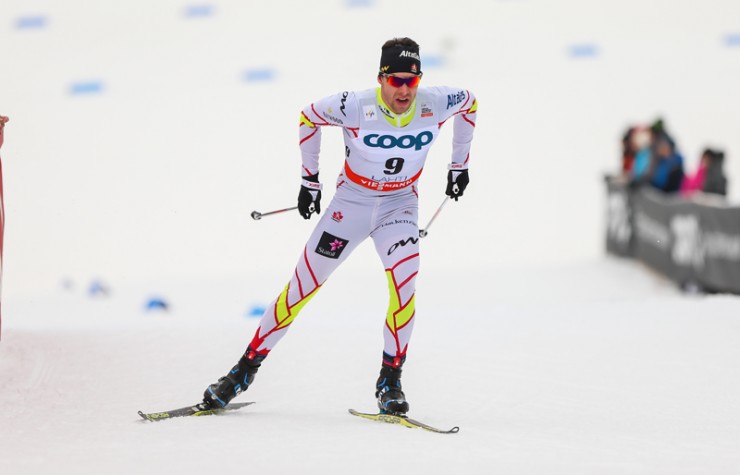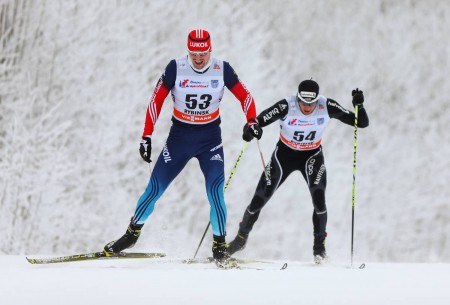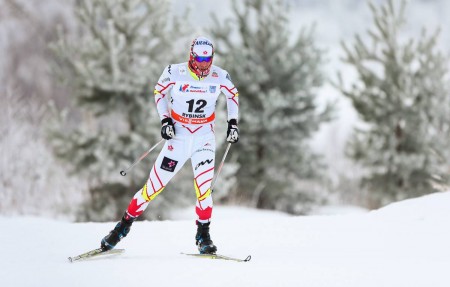
Canada’s Alex Harvey’s goal for the day was preparation: avoid wasted energy in the cold, eat right, and nail his pre-race ritual. He may want to continue whatever process he found Sunday morning, as the Canadian flew through the halfway point with the fastest time and found himself only 27.5 seconds down in second place at the end of the men’s 15-kilometer freestyle International Ski Federation (FIS) race in Gällivare, Sweden.
Like the Gällivare men’s podium on Saturday, the leading North American male found himself sandwiched between two Russians, Sergey Ustiugov, who repeated in first, and Evgeniy Belov, who landed on the third step of the podium for the second time in as many days, 42.2 seconds behind Ustiugov.
Harvey said in a post-race phone interview that he wanted to take advantage of this distance tuneup as an opportunity to “try a little different strategy.” For him, that meant “going out a bit harder, knowing I would fade a bit in the end.”
All in all, his new strategy paid dividends as he recorded the fastest split through the halfway mark, up 5.2 seconds on Ustiugov. He said he faded during the last lap, but thought he nailed the preparation and was happy to get in two solid race efforts throughout the course of the weekend. On Saturday, Harvey narrowly missed the final for seventh overall.

On the Russians’ consistent top finishes in these races, Harvey said that he’d heard from Russian coaches that their athletes “have to be in really good shape in Kuusamo, just to be able to stay on the World Cup, so right now they are quite fresh.”
The World Cup season starts Friday in Kuusamo, Finland, with a three-day mini tour.
Feeling fresh would have been a luxury for most of the North Americans, who arrived in Europe within the last ten days and are still adjusting to snow skiing.
“Skiing on snow is a bit more muscular than just rollerskiing, so the transition is always a bit hard for me at least,” Harvey said.
His teammate on the Canadian World Cup team, Devon Kershaw finished fourth, 1:05 behind Ustiugov and 22.8 seconds off the podium.
In an email, Kershaw explained he used his experience skiing this course on previous World Cups to create a race strategy.
“I really love the latter part of this type of course — it suits me well [to] hammer the flatter/gradual terrain and back it off a bit on the steeper sections,” he wrote.

Kershaw described the conditions as cold and fairly slow, with little humidity in the snow. While this played a minor role, he was more focused on executing his race strategy of speeding up each lap and working on technical queues.
“I am pleased with how I skied technically,” the classic specialist wrote. “I am happy to be only 1:05 back in a skate race, [which] means that it was probably my best individual start skate race in 1.5 years.”
After Stanislav Volzhentsev finished fifth (+1:13.2) to become the third Russian in the top five, American Noah Hoffman placed sixth (+1:23.5).
“My plan today was to go out aggressively, and I did that well,” Hoffman said in a USSA press release. “Next week’s individual start race is only a 10 k so I’ll need to go out hard. I faded a little on the last lap today, but I’m pleased with the way I skied, and I believe I can build on this performance in the coming weeks.”
Hoffman was 5.2 seconds ahead of seventh-place finisher, Sweden’s Marcus Hellner, who calls Gällivare his home course. Canadian Ivan Babikov placed eighth (+1:38.6), Martin Jaks of the Czech Republic was ninth (+1:42.8), and American Erik Bjornsen was 10th (+2:05.1). It was Bjornsen’s second top 10 in as many days. In Saturday’s sprint, he placed eighth.
“It wasn’t the effort I was looking for but that’s what these races are for, practice,” Bjornsen wrote in an email after the 15 k. “I’m hoping to build into the season.”
For most of the race, he had no idea where he stood, as he skied alone for most of it.
“…If it weren’t for the coaches doing a great job yelling at me I would have thought the race had been canceled or something,” Bjornsen wrote.
On Babikov’s personal website, he wrote after the race that the 15 k is one of his favorite races.
“I’m not very happy with way I paced myself, maybe I didn’t have enough time to get over a jet lag but I lost most of my time on the last 5km of the race,” Babikov wrote. “I’ll try not to repeat this mistake next weekend.”
Canadian Graeme Killick placed 11th (+2:06.9) for his second top 20 for the weekend (he was 19th in the sprint). American Kris Freeman (Team Freebird) was 16th (+2:24.5), and Saturday’s sprint runner-up, Andy Newell (U.S. Ski Team) was 23rd (+3:45.7) of 57 finishers.
Looking ahead, World Cup racers will travel to Kuusamo this week for the Ruka Triple World Cup opening races, starting with a classic sprint on Friday.
Jeremy Blazar
New to the FasterSkier team, Jeremy has been involved in many facets of the ski community since he began ditching middle school to go skiing. When not daydreaming of the Birkie, he finds time to explore the fishing and trail-running opportunities of his new home, Seattle, Wash.



